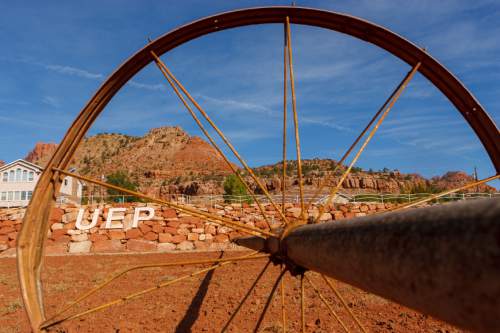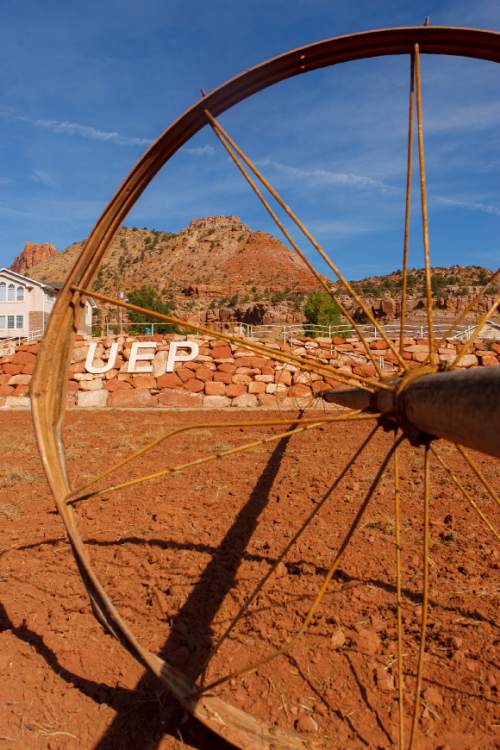This is an archived article that was published on sltrib.com in 2015, and information in the article may be outdated. It is provided only for personal research purposes and may not be reprinted.
The Utah state auditor's office says it can't examine the finances of a water utility suspected of sending money to the polygamous Fundamentalist Church of Jesus Christ of Latter-Day Saints because that utility is not a public agency.
Twin City Water Works in Hildale — thought for a while to be in Arizona — is incorporated as a nonprofit agency. According to a written analysis from the Utah auditor's office, Twin City Water is a vendor selling water to Hildale, and Hildale has no controlling interest in the utility.
In an interview Wednesday, Van Christensen, audit director for state auditor's office, pointed to Article VII, Section 15, of the Utah Constitution. It says the auditor shall audit "public accounts."
Christensen said while Twin City Water takes money from Hildale and adjoining, Colorado City, Ariz., that money becomes private once it lands in Twin City Water's bank account.
"As far as we know, [Twin City Water] provides the service for the amount that they agreed to provide it," Christensen said.
The auditor's written analysis, composed in July, also said Twin City Water Works was located in Arizona, presenting another barrier to a Utah audit. But incorporation papers list Twin City Water as having a Hildale address.
The fiduciary of the United Effort Plan requested the audit. The UEP owns much of the land in Hildale and Colorado City, collectively known as Short Creek. Utah seized the UEP in 2005 over concerns it was being mismanaged by FLDS President Warren Jeffs.
In requesting the audit, the UEP points to bank records seized by law enforcement in other proceedings against FLDS members. From January 2002 through October 2009, Twin City Water wrote checks totaling $145,103.82 to the "Bishop's Storehouse."
The UEP also cites a letter to Jeffs from Twin City Water administrator and current Colorado City Mayor Joseph Allred. It was dated April 23, 2006, at which time Jeffs — now serving a life sentence in Texas for sexually assaulting two underage girls he had married — was one of the most wanted fugitives in the country.
Allred described Twin City Water and how some revenues were going to the FLDS Church and that he was using some revenues to pay his family's expenses, including phone bills, car payments and utilities.
"I seek counsel on whether or not to continue paying some home bills from the company funds," Allred wrote.
Separate from the audit, the UEP has filed motions with Utah 3rd District Judge Denise Lindberg asking Twin City Water be put into receivership. The UEP cites the financial records and contends Twin City Water has been pumping wells on UEP land without valid leases. Lindberg has not scheduled a hearing to consider the request.
Jeff Shields, an attorney for the UEP, said last week he believes an audit is relevant to UEP's motion for a receiver. He said an engineer working for the UEP has inspected Twin City Water's wells and found they are in poor condition. Shields said that raises a question of what Twin City Water is doing with its money.
Twin City Water gets "all this money from the city, like $20,000 a month," Shields said, "and they're supposed to maintain the wells, and they don't."
To oppose the motion for receivership, Twin City Water has submitted an affidavit from the utility's bookkeeper saying it has enough money to pay its bills. The bookkeeper, Sarah Olds, also said Twin City Water has not given money to the FLDS Church in the time she has worked there.
Twin City Water's attorney, Joe Covey, said the issue in the receivership motion should be whether the utility has money to pay its bills.
"Whether there were transfers to the FLDS Church five years ago is totally irrelevant," Covey said.
The UEP also contends Twin City Water overcharges customers. Utah auditor documents show Twin City Water is charging users a rate of 69.3 cents per 1,000 gallons. The Washington County Water Conservancy District, which serves other cities in Washington County, charges 84 cents per 1,000 gallons.
Twitter: @natecarlisle





